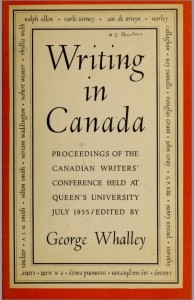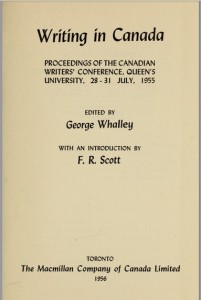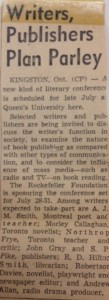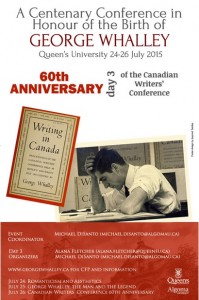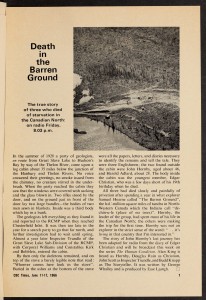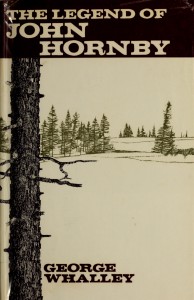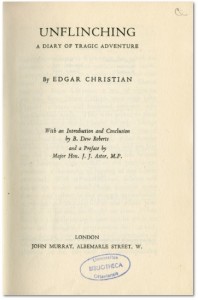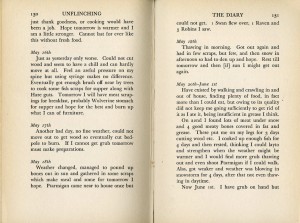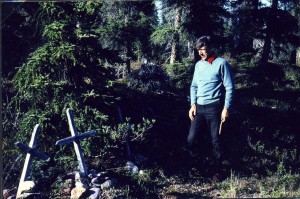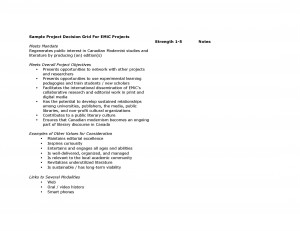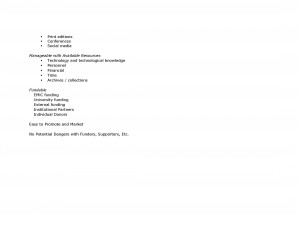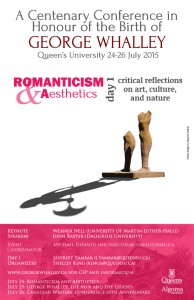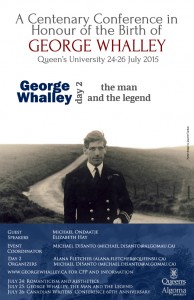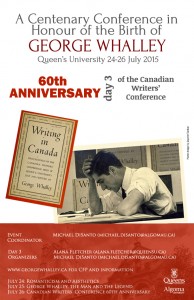Community
October 24, 2014
Friday Roundup of DH Events & Deadlines
CSDH/SCHN Outstanding Achievement Award for Computing in the Arts and Humanities
Know a Canadian researcher or a researcher at a Canadian institution who has made a significant contribution, over an extended career, to computing in the arts and humanities? With your nomination, they could be receive the CSDH/SCHN Outstanding Achievement Award for Computing in the Arts and Humanities and be invited to address the society in a plenary session of the annual conference at Congress, which will be held in Ottawa in the spring of 2015.
For a list of previous recipients, see http://csdh-schn.org/activities-activites/outstanding-awards-prix/
Nominations of up to 500 words must be submitted by October 31, 2014. Only current members of CSDH/SCHN are eligible to submit nominations. Nominations must be sent by email to the chair of the CSDH/SCHN Awards Committee (dean.irvine@dal.ca).
IMAGINATIONS, 46th Annual Conference of the College English Association
The College English Association, a gathering of scholar-teachers in English studies, will have its annual conference in Indianapolis, Indiana, March 26-28, 2015.
The special panel chair for Digital Humanities welcomes proposals for papers and panels addressing the following topics:
- DH projects (digital collections/archives, digital editions, interactive maps, 3D models, etc.)
- DH research tools (text analysis, visualization, GIS mapping, etc.)
- DH pedagogy (teaching methodologies, curriculum development, project collaboration, etc.)
- DH centers (supporting research, consulting services, teaching faculty/students, etc.)
- Digital Project Management
- Data Curation
- The Future of DH
Please submit your paper title and abstract (200-500 words) to http://cea-web.org/ by 1 November 2014.
ELO Conference: The End(s) of Electronic Literature
(For anyone who happens to be in Norway August 5-7, 2015)
The 2015 Electronic Literature Organization conference and festival will take place in Bergen, Norway. This year’s theme encompasses the following topics: what comes after electronic literature, what purposes do works of electronic literature serve, international practices in electronic literature, electronic literature and other disciplines, and digital reading experiences made for children.
The deadline for submissions of research, workshop, and art proposals is December 15, 2014. More information can be found at http://conference.eliterature.org/.
October 14, 2014
Writing in Canada Digital Publication and Conference
More new content on the George Whalley website!
It’s with pleasure that we’ve now made available on the Whalley site a digital copy of Writing in Canada, George Whalley’s edited proceedings of the prestigious Canadian Writers’ Conference held at Queen’s University in July 1955.
The 1955 conference was a veritable who’s who of writers in Canada, with delegates including Earle Birney, Desmond Pacey, Eli Mandel, Anne Wilkinson, Dorothy Livesay, Hugh Garner, James Reaney, Jay Macpherson, Phyllis Webb, Adele Wiseman, Ralph Gustafson, Douglas Spettigue, Miriam Waddington, Irving Layton, Frank Scott, Louis Dudek, A.J.M. Smith, and Morley Callaghan.
Writers and critics were brought together at the conference with publishers, journalists, and interested members of the public to investigate a number of common concerns with writing in Canada, from concrete problems like a lack of contemporary Canadian poetry in school texts and a need for cheap editions of Canadian works to broader questions about what people read in Canada, whether criticism is beneficial to writing, and the impending obsolescence of the book form. All of these questions have echoed throughout Canadian literary history; Editing Modernism itself is part of a movement towards remediating the issues of access to Canadian books identified in 1955.
As Douglas Fetherling observed in the Kingston Whig-Standard in 1988, the conference took place at a decisive moment in Canadian cultural (and especially literary) history, with the Massey Report fresh off the press and the Canada Council just over the horizon. “To the delegates attending the Kingston conference,” writes Fetherling, “the future was of course unclear. But they appeared to sense that they were standing on a threshold. It must have seemed that anything was possible.” This sense of possibility permeates Writing in Canada, as does the intensity with which various means of fulfilling it were advocated—an intensity that led Whalley to describe conference discussion as a kind of “extreme literary criticism … in which the various branches of literature attacked each other unmercifully and accused each other of all kinds of crimes and fancies, some of them unmentionable” (Writing in Canada MS, QUA).
Writing in Canada’s reflection of this influential and highly-charged moment in Canadian literary history is must-read material for anyone interested in the direction of literary production and the cohesion of literary community in Canada. It is an especially apt historical touchstone to consult in the run-up to 60th anniversary of the Canadian Writers’ Conference taking place this coming July at Queen’s University.
We hope this meeting, which is part of a larger three-day conference held in honour of George Whalley’s centenary, will revisit some of the issues of 1955 in a contemporary context with an intensity to rival that of ’55.
Find the full text of Writing in Canada here and the call for papers for the 60th anniversary of the Canadian Writers’ Conference here. And don’t forget to get your conference paper proposals in to us by October 31st!
October 9, 2014
Death in the Barren Ground
We here at the George Whalley project are pleased to announce the availability on the George Whalley website of a section of one of Whalley’s most riveting broadcasts, “Death in the Barren Ground.” This 30-minute audio drama was aired on CBC radio’s Wednesday Night on 3 March 1954, and was re-broadcast on the same program in June 1954, by CBC’s International Service in December 1957, and on CBC’s The Human Condition in April and June 1967. It appeared on television over still photographs on CBC’s Explorations on 28 October 1959, and was repeated in this form on CBC TV’s Q for Quest on 6 June 1961. It is one of the many professional broadcasts Whalley prepared for the CBC between 1953 and 1971, the full bibliography of which can be found here.
“Death in the Barren Ground” tells the dramatic story of the last journey of John Hornby (1880-1927), an English explorer best known for his travels in the Northwest Territories. The story begins with the discovery of the bodies of Hornby and his travelling companions Edgar Christian and Harold Adlard—all of whom, as the CBC Times description puts it, “died slowly and painfully of privation … in what explorer Samuel Hearne called ‘The Barren Ground’”—by a party of geologists traveling the Thelon River in 1928.
The drama unfolds on a framework provided by Edgar Christian’s diaries, which were found in the stove of the ill-fated party’s cabin on the Thelon. These diary excerpts carry the bulk of the narrative, with a narrator and some invented speech from both Hornby and Christian filling it out. A number of other important historical documents are woven throughout: a diary of Hornby’s (reported in Christian’s own), Hornby’s will, unsent letters from Christian to his parents, and the 1929 report of the G-division commanding officer of the RCMP on the burial of the bodies and the collection of the documents.
Whalley’s interest in the last journey of John Hornby and in Edgar Christian’s role as its de facto historiographer was longstanding. In 1962, Whalley would publish a biography of Hornby, titled The Legend of John Hornby.
This was the first published text to include the letters Christian wrote to his mother and father as he was dying, in which he implores “Please don’t blame dear Jack.”
In 1980 this biography was followed by Death in the Barren Ground: The Diary of Edgar Christian, a newly edited version of Christian’s diary, which had previously been published in 1937 as Unflinching: The Diary of Edgar Christian.
Whalley’s reading of the 1937 Diary was the inspiration for the radio and television broadcasts, as well as his later work on Hornby and Christian. In 1971 Whalley took a trip to the Hornby cabin and visited the sparsely marked sites where the bodies of Hornby, Christian, and Adlard are buried.
Find the full audio version of “Death in the Barren Ground” here. In this version from CBC’s Wednesday Night, the narrator is Frank Paddy, Edgar Christian is played by Douglas Rain, John Hornby by Alan King, and Inspector Trundle by Jim McRae. Happy listening!
October 7, 2014
Project Decision Making
It is one month into the academic year, and, even as someone who is working outside of academia, I’m getting that nagging feeling that October is here, the transition-month of September has passed, and it is time to put some momentum behind projects that were dormant over the summer or ideas that have been waiting for the new season in order to materialize.
I received some useful resources from a management and governance workshop for non-profits, including a sample decision-making grid. The grid lists qualities and objectives that a project should fulfill in keeping with the organization’s mandate, and potential projects can be rated from one to five for how well they meet each requirement in order to benefit the overall organization. While there is no set score that a potential project should achieve, the grid is a useful tool for thinking through a project’s feasibility and projected outcomes. It is definitely a tool that I will apply to my bpNichol digital edition project (which is broken into three sub-projects), to see whether or not I should change my approach, especially after meeting certain obstacles during my MA while trying to design a website. The grid could easily be tailored to determine if an editing project is a good fit for EMiC, if a certain editorial approach is appropriate for an individual project, or even if a particular work should be included in a collection based on how it contributes to the objectives of the finished edition.
A sample decision-making grid for potential EMiC projects is pictured below and also attached as a Sample Project Decision Grid PDF.
October 3, 2014
Call for Nominations: CSDH/SCHN Outstanding Achievement Award for Computing in the Arts and Humanities
Call for Nominations
CSDH/SCHN Outstanding Achievement Award for Computing in the Arts and Humanities
The CSDH/SDCH Outstanding Achievement Award for Computing in the Arts and Humanities acknowledges a Canadian researcher or a researcher at a Canadian institution who has made a significant contribution, over an extended career, to computing in the arts and humanities, whether theoretical, applied, or in the area of community building. The recipient will be invited to accept the award and to address the society in a plenary session of the annual conference at Congress, which will be held in Ottawa in the spring of 2015.
This award is generally given to someone who has made a substantial and prolonged contribution to the community, typically a senior researcher. We have awarded it to teams. We have awarded it posthumously in recognition of a lifetime contribution. We also recognize people who have served the community in a service capacity and therefore may not have a faculty position. For a list of previous recipients, see http://csdh-schn.org/activities-activites/outstanding-awards-prix/
Nominations of up to 500 words must be submitted by October 31, 2014. Only current current members of CSDH/SCHN are eligible to submit nominations. Nominations must be sent by email to the chair of the CSDH/SCHN Awards Committee (dean.irvine@dal.ca).
The Awards committee will compile a short list, confirm with nominees whether they are willing to be considered, and request the submission of supporting material (CV, letters of support, access to contributions or projects if not readily accessible) by December 15, 2014. Adjudication of the award will be conducted by the CSDH/SDCH Awards Committee (Dean Irvine, Susan Brown, Juan Luis Suarez, Kevin Kee, and Janelle Jenstad), who may consult the CSDH/SCHN Executive or external members of the community for assistance in evaluating applications. Selection will be made by the end of December 2014. An announcement will be made in spring 2014, along with the release of the CSDH/SCHN conference program for Congress 2015.
September 26, 2014
EMiC @DHSI2015
We are pleased to announce that Editing Modernism in Canada will once again be partnering with the Digital Humanities Summer Institute (DHSI) in order to offer opportunities for project members to participate in DH courses offered over three weeks at the University of Victoria: June 1st-5th 2015, June 8th-12th 2015, and June 15th-19th 2015.
Registration for DHSI is now open. This year will see an expansion from the regular 1 week institute to 3 weeks of courses, in part to support those enrolled in the Graduate Certificate in Digital Humanities at U Victoria. Participants may choose to attend 1, 2, or all 3 week-long sessions. In 2015, 40 courses ranging from old favourites to exciting first-time ventures will be on offer. Each week of DHSI will include a week-long training workshop, and the core week (June 8th-12th) will also include morning colloquia, lunchtime unconferences, and Birds-of-a-Feather sessions. Throughout the institute, keynotes will be delivered by Malte Rehbein (U Passau), David Hoover (NYU), Claire Warwick (UC London), and Constance Crompton (UBC Okanagan). Tuition scholarships are available for students, and other EMiC participants (co-applicants, collaborators, postdocs, partners) can register at a discounted cost of $300.00 for students and $650.00 for non-students (for registration before April 1st 2015).
EMiC Director Dean Irvine will be teaching “Digital Indigeneity” at DHSI 2015 during the core week. For a full list of courses, to register, to apply for a tuition scholarship, or for more information, please go to dhsi.org. Make sure to register with an EMiC discount code (EMiC-Student or EMiC-Non-Student).
Please note that although we can offer discounted registrations for DHSI 2015, we cannot offer subventions for travel or accommodations. There is no application process this year. You should register directly through the dhsi.org website and arrange for your own transportation and accommodations. Students are strongly encouraged to take advantage of the generous DHSI tuition scholarship program.
In the meantime, keep posting your DH stories on the EMiC blog. And watch out for the public launch of the Modernist Commons later this fall. We’re in the process of trying to arrange on-site workshops for early adopters of the Modernist Commons; if your institution may be interested in hosting a workshop, contact us at emic@dal.ca.
September 19, 2014
Whalley Conference site and posters
At the George Whalley website a section is now dedicated to the conference in honour of Whalley to be held at Queen’s University, 24-26 July 2015. An attractive poster for each of the three days has been designed by Jaspreet Tambar, a graduate student at Queen’s University.
The call for papers for the first day is available here.
The call for papers for the second day is available here.
The call for papers for the third day is available here.
The deadline for proposals is 15 January 2015.
September 15, 2014
George Whalley Film Biography
A short film biography of George Whalley is now available here. It has also been published on Youtube here. It is meant to be a concise introduction to Whalley’s life and works.
The film production is by Evan Wainio, an undergraduate film student at York University. He used photographs from the Whalley Estate, Queen’s University Archives, Bishop’s University Archives, Victoria University Library (Toronto), the Imperial War Museum, the German Federal Archives, and the Naval Historical Foundation. Some individuals also provided photos for the film.
The narrator is Brian Brockenshire. I wrote the script.
With some luck, the film will bring to Whalley’s life and writings some renewed attention leading up to the conference in honour of the centenary of his birth to be held at Queen’s University, 24-26 July 2015.
September 11, 2014
CFP: Codex-tensions: Canadian Writing Beyond the Book-Machine
CFP: Codex-tensions: Canadian Writing Beyond the Book-Machine
Member-Organized Session for ACCUTE 2015 (30 May – 2 June 2015) in Ottawa
Panel organized by Christopher Doody (Carleton U) & Eric Schmaltz (York U) 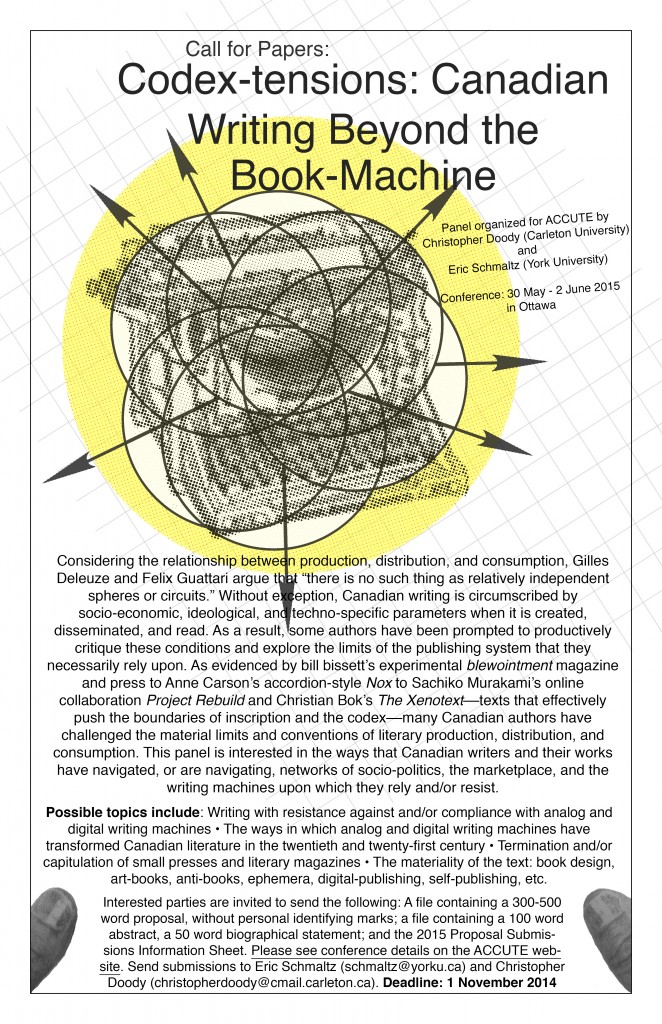
Considering the relationship between production, distribution, and consumption, Gilles Deleuze and Felix Guattari argue that “there is no such thing as relatively independent spheres or circuits.” Without exception, Canadian writing is circumscribed by socio-economic, ideological, and techno-specific parameters when it is created, disseminated, and read. As a result, some authors have been prompted to productively critique these conditions and explore the limits of the publishing system that they necessarily rely upon. As evidenced by bill bissett’s experimental blewointment magazine and press to Anne Carson’s accordion-style Nox to Sachiko Murakami’s online collaboration Project Rebuild and Christian Bok’s The Xenotext––texts that effectively push the boundaries of inscription and the codex––many Canadian authors have challenged the material limits and conventions of literary production, distribution, and consumption. This panel is interested in the ways that Canadian writers and their works have navigated, or are navigating, networks of socio-politics, the marketplace, and the writing machines upon which they rely and/or resist.
Possible topics include (but are not limited to):
- Writing with resistance against and/or compliance with analog and digital writing machines
- The ways in which analog and digital writing machines have transformed Canadian literature in the twentieth and twenty-first century
- Termination and/or capitulation of small presses and literary magazines
- The materiality of the text: book design, art-books, anti-books, ephemera, digital-publishing, self-publishing, etc.
Interested parties are invited to send the following: A file containing a 300-500 word proposal, without personal identifying marks; a file containing a 100 word abstract, a 50 word biographical statement, and the 2015 Proposal Submissions Information Sheet. Please see conference details on the ACCUTE website. Send submissions to Eric Schmaltz (schmaltz@yorku.ca) and Christopher Doody (christopherdoody@cmail.carleton.ca).
Deadline: 1 November 2014
September 5, 2014
Friday Roundup
It’s been a busy week for everyone with back to school and back to teaching, and a busy week in DH and modernism on the web. Here’s a roundup of events, CFPs, and jobs that the EMiC community might find of interest:
- The College English Association, a gathering of scholar-teachers in English studies, welcomes proposals for presentations for our 46th annual conference, on the theme of IMAGINATIONS. Conference: March 26-28, 2015 | INDIANAPOLIS, INDIANA Submission deadline: 1 November 2014 at http://cea-web.org/ The special panel chair for Digital Humanities (E. Leigh Bonds <leigh.bonds@case.edu>) welcomes proposals for papers and panels addressing the following topics:
- DH projects (digital collections/archives, digital editions, interactive maps, 3D models, etc.)
- DH research tools (text analysis, visualization, GIS mapping, etc.)
- DH pedagogy (teaching methodologies, curriculum development, project collaboration, etc.)
- DH centers (supporting research, consulting services, teaching faculty/students, etc.)
- Digital Project Management
- Data Curation
- The Future of DH
- The Northeast Modern Language Association (NeMLA) is holding its 2015 conference in Toronto, and there are a number of panels of interest to (or organized by members of) the EMiC community. Abstracts are due September 30: https://nemla.org/convention/2015/cfp.html
- Interested in becoming a Digital Humanities Specialist at the University of Alberta? The posting closes September 30. http://careers.ualberta.ca/Competition/S101324477/
- It’s back to school at HASTAC too, and they’ve got lots going on
- Applications for the HASTAC Scholars program are due on September 15: http://www.hastac.org/scholars/apply/form
- Proposals for the 2015 HASTAC conference are due October 15: http://www.hastac2015.org/call-for-proposals/
- The new HASTAC hub at the Graduate Centre at CUNY, The Futures Initiative, is well worth a look: http://www.gc.cuny.edu/Page-Elements/Academics-Research-Centers-Initiatives/Initiatives-and-Committees/The-Futures-Initiative
- Chronicle Vitae has recently launched a series of discussion groups that are already bringing scholars and alternative academics across many fields. You can check out the existing ones here, and there are more to come: https://chroniclevitae.com/groups
- DHSI 2015 is still a ways off, but the new three-week course schedule and course descriptions (including a number of courses designed and taught by the members of the EMiC community) are already online. Scope out the offerings here: http://dhsi.org/courses.php
- The Modernist Studies Association journal Modernism/Modernity has a new Facebook page. Check it out here: https://www.facebook.com/mod.modernity?fref=ts
- If you haven’t yet taken a look at the incredible work being done by the Modernist Magazines Project Canada, you really should: http://modmag.ca/
Happy weekend!
